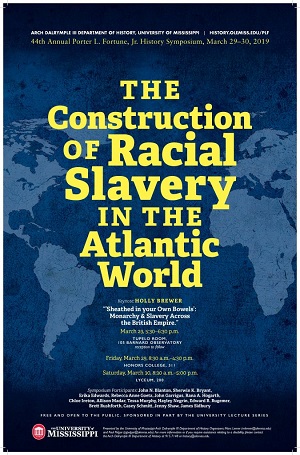
2019: The Construction of Racial Slavery in the Atlantic World
From Africans to Americans: African Settlers and Slaves in 16th Century Spanish America
Document Type
Event
Location
Honors College 311
Start Date
29-3-2019 9:00 AM
End Date
29-3-2019 9:45 AM
Description
This presentation is about the arrival of African settlers and/or slaves to Spanish America in the 16th century. As settlers they partook in various expeditions that led to conquests of Indian empires and the subsequent destruction of their populations, encomenderos, or holders of a royal grant of Indian labor and tribute, and defenders of the Spanish Crown against its foreign enemies. As slaves, they contributed to the growth of the urban economies as domestic workers and artisans and labored in plantations and mines. Together as settlers and/or slaves these roles led to the economic, political, and cultural development of Spanish America for the next 300 years. By interrogating these roles, this presentation delves into the scholarship of the African arrivals to Spanish America during the 16th century. It moves beyond the notion that all Africans first arrived to the Americas as slaves and instead reveals how scholars have developed a more complex understanding of the vital and diverse roles Africans played in the early development of Spanish America.
By focusing on the arrival of Africans to Spanish America more than one hundred years prior to the first disembarkation of African slaves to British North America, this presentation also moves beyond the North American black experience that has become the dominate narrative of black experiences in the Americas. First it serves as a reminder that Africans arrived to the Americas over 500 years ago. Second, it encourages scholars of Atlantic Africa, the slave trade, and slavery throughout the Americas to embrace the arrival of Africans to the Americas as a more inclusive process that elicits a shared African diasporic experience. Third, this presentation calls for a reexamination of the term African-American, from an exclusive term that references slave descendants in the United States of America, to Africans who became Americans throughout the Americas.
Relational Format
Conference Proceeding
Recommended Citation
Edwards, Erika, "From Africans to Americans: African Settlers and Slaves in 16th Century Spanish America" (2019). Porter L. Fortune, Jr. Symposium. 14.
https://egrove.olemiss.edu/plf/2019/schedule/14
From Africans to Americans: African Settlers and Slaves in 16th Century Spanish America
Honors College 311
This presentation is about the arrival of African settlers and/or slaves to Spanish America in the 16th century. As settlers they partook in various expeditions that led to conquests of Indian empires and the subsequent destruction of their populations, encomenderos, or holders of a royal grant of Indian labor and tribute, and defenders of the Spanish Crown against its foreign enemies. As slaves, they contributed to the growth of the urban economies as domestic workers and artisans and labored in plantations and mines. Together as settlers and/or slaves these roles led to the economic, political, and cultural development of Spanish America for the next 300 years. By interrogating these roles, this presentation delves into the scholarship of the African arrivals to Spanish America during the 16th century. It moves beyond the notion that all Africans first arrived to the Americas as slaves and instead reveals how scholars have developed a more complex understanding of the vital and diverse roles Africans played in the early development of Spanish America.
By focusing on the arrival of Africans to Spanish America more than one hundred years prior to the first disembarkation of African slaves to British North America, this presentation also moves beyond the North American black experience that has become the dominate narrative of black experiences in the Americas. First it serves as a reminder that Africans arrived to the Americas over 500 years ago. Second, it encourages scholars of Atlantic Africa, the slave trade, and slavery throughout the Americas to embrace the arrival of Africans to the Americas as a more inclusive process that elicits a shared African diasporic experience. Third, this presentation calls for a reexamination of the term African-American, from an exclusive term that references slave descendants in the United States of America, to Africans who became Americans throughout the Americas.

